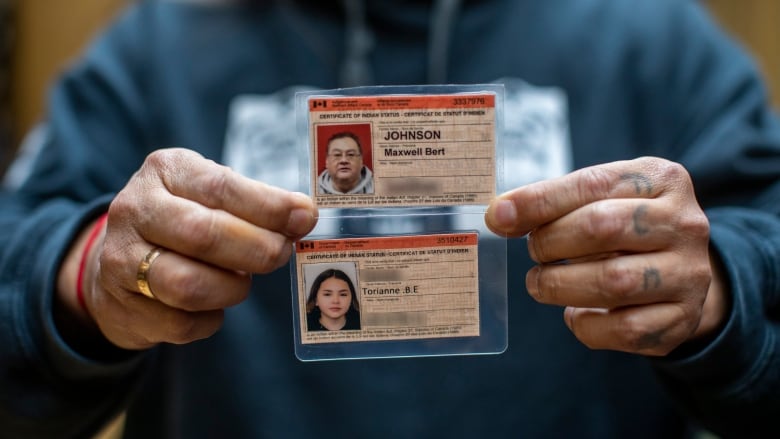Indigenous people often denied access to Canadian institutions because of status card misinformation
Indigenous Services Canada says reconciliation a crucial government priority

When Maxwell Johnson took his 12-year-old granddaughter into a Vancouver bank just before Christmas to open an account for her, the pair used their Indian status cards as identification and ended up in police handcuffs, accused of fraud.
A status card isgovernment ID that identifies someone as a status Indian, as defined by the federal Indian Act.The cardshave been a valid piece of identification in Canada for the last 64 years and yet many cardholders say they have faced similar confusion and discrimination when trying to use them.
"I don't know a Native person who has a status card who hasn't experienced discrimination in using that status card in a wide variety of scenarios," saidPamelaPalmater, Mi'kmaq lawyer and author of Beyond Blood: Rethinking Indigenous Identity.
The cards can be used for health coverage, dental expenses, to cross the Canadian-American border, to open bank accounts and for specific tax exemptions.In some cases, like opening a bank account, an institution may also require a secondary ID.
Im always asked for a second piece of ID.
—@migizikwe_mleThompson Rivers Universitylaw student Darnel Tailfeathers, 25,said he tried to get his daughter's teeth cleanedat a dentist in Kamloops and the receptionist at the front desk was unsure what to do when Tailfeathers presented her with a status card.
"She had no clue the procedure after that. She was kind of almost clueless what it was," said Tailfeathers. "It was almost like a half hour at the front desk."
Tailfeather'sexperienceisnot unique.
"You get extra security, you get extra questions at customs," said Palmater.
My experience as a non-Indigenous person who worked many retail jobs is we were told if anyone presented the card to: pretend you know nothing about it
pretend you dont have the correct paperwork
kick them out of the store
As workers we didnt have any choice but to deny them.
—@RobertC76478857Always showing my status card at the border crossings and the guards complaining about how long it takes them to type in the info. Never had my card refused but would get weird looks for having one when off-reserve.
—@derpydoogieCertain tax exemptions exist only on reserve lands andstem from treaty agreements between the Crown and First Nations when the Crown guaranteed particular services in exchange for title to the land.
Not all status cards look the same and this could be cause for some confusion.
An older iteration of the cards are laminated forms with a name, birthdate and registration number. The new cards have a hologram and are easier to validate. Status cards can be issued in any of the more than 600 band offices across Canada and new cards are issued atIndigenous and Northern Affairs offices.
Its always an issue, especially as someone holding a treaty card without an expiry date. Also, I dont necessarily suit their view of how an Aboriginal woman should look.
—@deecohen_My daughter tried to use it to register for distance learning. She has an american birth certificate and needed to prove canadian citizenship in order to enroll. We had to wait a day or so for the registrar to check into it before she could sign up.
—@sherrymcintyreJohnson said his granddaughter's status card was an older iteration of the card andtwo numbers on it were reversed, which could have been why the bank was unable to validate her identity.
Those issued by an Indigenous and Northern Affairs Canada regional officehave a hologram, making them easier to validate, but the wait time for those cards is approximately 18 months.
The federal government is responsible for disseminating information about status cards.
CBC asked Indigenous Services Canada for an interview. Minister Marc Miller was unavailable
In a statement, Miller said instances of discrimination against Indigenous people, like the recent one in Vancouverinvolving Johnson and his granddaughter, are abhorrent and unacceptable.
"We know that there is more to be done and we will continue working closely with Canadians to build a country in which Indigenous Peoples can live free of discrimination," said Miller's statement. "Reconciliation remains a crucial priority for our government and we are working in partnership to advance a relationship that is based on the recognition of inherent rights, respect and cooperation."
To hear the CBC's Angela Sterrittdiscuss Indian status cards on The Early Edition, tap the audio link below:
With files from Angela Sterritt












_(720p).jpg)


 OFFICIAL HD MUSIC VIDEO.jpg)
.jpg)



























































































